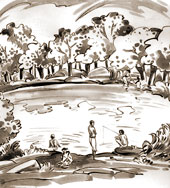 |
Back in the Nineties, freelance graphic designer Surendra Bansal came across a literary review of a book in the Hindi newspaper, Jansatta. Impressed, he ordered a copy of Aaj Bhi Khare Hain Talab, which roughly translates as, the ponds are still as good as gold.
The book sucked Bansal into its world. He read every chapter several times over. Soon, he felt an ardent desire to translate the book into Punjabi. But money was in short supply. Undeterred, Bansal sold off his prized cacti collection for Rs 11,500 to finance the project. ?The book changed my entire life,? says Bansal, now a practising environmentalist. He goes around rural Punjab meeting sants, folk singers, literateurs and gurdwara officials distributing copies of the book he has translated.
Bansal is not an isolated case. Dogged environmentalists, conscientious civil administrators as well as common folk in different parts of India admit that Aaj Bhi... influenced the course of their lives. In arid, rural Rajasthan, Anupam Mishra?s 120-page tome, first published in 1993, is a handbook for many NGOs working on water-harvesting projects. Magsaysay Award-winner Rajinder Singh says that the book was born out of the water conservation movement and helped expand its ambit. ?It encourages you to get involved,? he says.
Aaj Bhi... is about the ponds of India: how they served as the lifeblood of the countryside for centuries and how the indigenous traditional knowledge that went into their creation is being forgotten. And how India?s water problem can be solved to a large degree through preservation, maintenance and regeneration of ponds.
It is a strange book. The author?s name is missing from the cover. There is no copyright either. Anybody is free to publish the book. The idea behind putting the writer?s name on page 2 in a small point size, says writer Mishra, is to make the reader feel that the book is his own. ?Otherwise, why would someone take the initiative to publish another individual?s work?? he asks.
The book, written after eight years of research, has flourished through word of mouth. Printed copies are now close to the magic 100,000 figure. And the National Book Trust is shortly going to publish it in 13 languages, including English.
For Mishra, the book is like a seed for change. On many occasions, he sends across a free copy of his carefully-researched treatise to readers in remote areas. Every copy is packed by him personally and includes a handwritten note. He believes in building a personal relationship with his readers. ?I correspond with about 3,000-odd readers. The idea is to create awareness and build a movement through the book. You cannot do that without forming an enduring relationship with your reader,? he says.
So, when Nirupama Adhikari, a freelance journalist from Purulia, rang him up one day expressing her desire to translate the book into Bengali, Mishra?s first question was: Could she afford to do it? ?It is important to get the message going. But one should avoid taking extreme measures to do so,? he says.
But Adhikari, who had grown up in a village and had observed the importance of pukurs first-hand, was too excited by the book to be deterred by words of caution. ?I finished it in one sitting reading deep into the night,? she says.
Helped by a core group of friends, she not only translated the book but has built a small movement to protect and preserve ponds in Purulia. ?The water table is falling in West Bengal. Ponds are the only way out,? she says.
Such examples abound. According to Mishra, various civil servants in Madhya Pradesh have used the book as a model. In the Nineties, the collectors of Sagar, Shivpuri and Damoh distributed copies of the book and encouraged villagers to repair ponds in their respective areas. With the book covering most parts of India, many found a local flavour in its pages.
For instance, journalist Anil Yadav was inspired by the book to write a history of ponds in his hometown Vidisha.
For Mishra, who works in the environment cell of New Delhi?s Gandhi Peace Foundation, the book emerged out of what he saw and experienced. Having travelled to various parts of the country on field assignments, he was intrigued to find ponds in several parts of the north Indian desert. In most places, he was told the ponds were a hundred years old or more. ?A lot of native knowledge and traditional wisdom had gone into the making of these ponds. Obviously, we were a far more water-literate society once,? he says.
Research brought revelation. Mishra discovered India was teeming with ponds right through history. Madras Presidency alone had 53,000 ponds in the late 19th century. He stumbled upon an invaluable 1930 map which showed that Delhi had about 350 ponds then. Few survive today.
The book, says the Rajasthan-based Singh, tries to understand water conservation in its local context. Aaj Bhi... links up the traditional practice of worshipping water bodies with common sense: the perceived sacredness acting as an insurance against ravagers. However, in the colonial period, as the focus shifted to ground water from natural water, their importance declined. ?Few know today,? says Mishra, ?that there were communities dedicated to building ponds in different parts of India. Those people are lost to history today.?
Through the book, Mishra hopes to create an alternative history. As journalist Prasun Latant, who has written extensively on the book, sums up: ?Aaj Bhi Khare Hain Talab holds your hand and takes you somewhere. There are no heroes in the book. But the book is a hero.?










